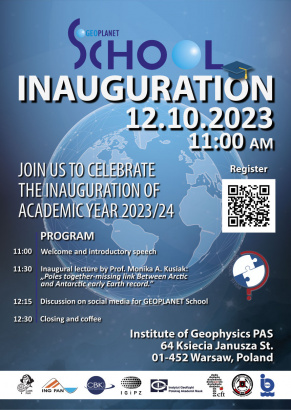GeoPlanet Inauguration of the academic year 2023/2024
The inaugural lecture of the 2023/2024 academic year, titled “Poles together – missing link between Arctic and Antarctic early Earth record“, will be given by Prof. Monika A. Kusiak (Institute of Geophysics, Polish Academy of Sciences). The inauguration of the academic year will take place on October 12, 2023 at 11 a.m., at the Institute of Geophysics and online (hybrid event).
Poles together – missing links between Arctic and Antarctic early Earth records.
From the time of Earth formation around 4.56 billion years ago (Ga) to the end of the meteoritic Late Heavy Bombardment that affected all rocky planets until ca. 3.8 Ga, there is little evidence concerning the extent or composition of the Earth’s crust. On Earth from 4.5 to 4.0 Ga (the Hadean), no rock record remains, but rare crystals of the mineral zircon (ZrSiO4) provide minute time capsules of what our planet’s crust was like. Between 4.0 and 3.6 Ga, a partial rock record is preserved in just a few terranes on Earth, and chemical relationships between the chemistry of these rocks and the zircons they contain allow us to infer composition and extent of the earliest crust. Most of these terranes remain under-investigated, especially those in the polar and subpolar regions, where there is the greatest potential for discoveries of new areas of Eoarchean crust. During the talk, Prof. Monika A. Kusiak will tell about features of early Earth processes and new results from the “Poles Together” project.
From the time of Earth formation around 4.56 billion years ago (Ga) to the end of the meteoritic Late Heavy Bombardment that affected all rocky planets until ca. 3.8 Ga, there is little evidence concerning the extent or composition of the Earth’s crust. On Earth from 4.5 to 4.0 Ga (the Hadean), no rock record remains, but rare crystals of the mineral zircon (ZrSiO4) provide minute time capsules of what our planet’s crust was like. Between 4.0 and 3.6 Ga, a partial rock record is preserved in just a few terranes on Earth, and chemical relationships between the chemistry of these rocks and the zircons they contain allow us to infer composition and extent of the earliest crust. Most of these terranes remain under-investigated, especially those in the polar and subpolar regions, where there is the greatest potential for discoveries of new areas of Eoarchean crust. During the talk, Prof. Monika A. Kusiak will tell about features of early Earth processes and new results from the “Poles Together” project.
Monika A. Kusiak is a Professor in the Department of Polar and Marine Sciences of the Institute of Geophyscis, Polish Academy of Sciences, in Warsaw and Secretary of the Committee of Mineralogical Sciences Polish Academy of Sciences (KNM PAN).
Her research is concentrated on the U-Th-Pb geochronology of accessory minerals (zircon, monazite, xenotime) in evolving magmatic systems and resetting of isotope systematics by metamorphic, hydrothermal and diagenetic processes. Her current investigations focus on applying a variety of isotope techniques to zircon grains from ancient rocks, mostly obtained from polar regions (Antarctica, Greenland, Labrador), in order to understand the behaviour of elements at the nano- as well as the micro-scale. She is particularly interested in early Earth processes. She has participated in 11 polar expeditions, leading 6 of them. Monika conducted her research in Japan, Australia, Sweden and Germany. She is an alumni of the Japanese Society for the Promotion of Sciences, Foundation for Polish Sciences, Marie Skłodowska-Curie Fellowship, Alexander von Humboldt Foundation and NASA. Monika is the head of the “Poles together” grant to study the oldest rocks on Earth.
- Please register by filling a short form by October 8th.


















